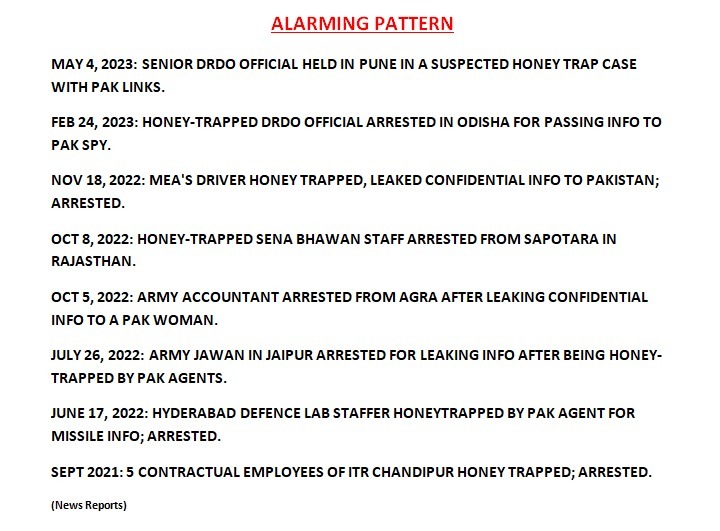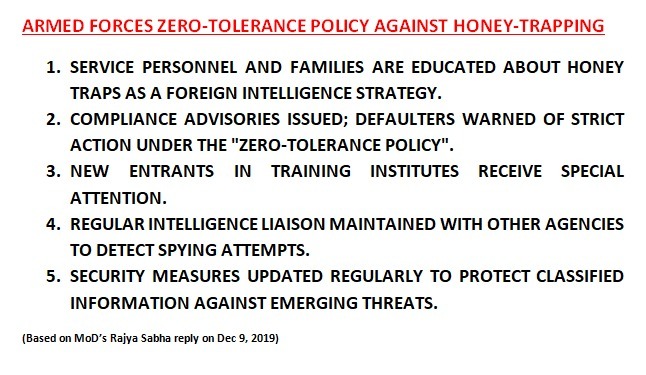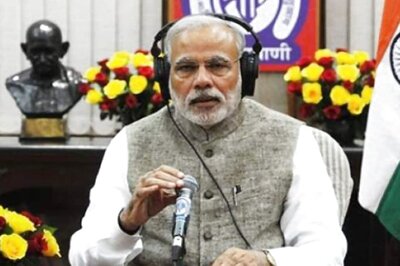
views
The arrest of a senior Defence Research and Development Organisation (DRDO) official in Pune by Maharashtra ATS in a suspected case of honey trap last week has brought to the fore once again the concerning issue of securing the country’s strategic secrets and ensuring our men don’t fall into enemy traps.
The 59-year-old accused, Pradeep M Kurulkar, was holding a senior position in India’s premier defence research institute and allegedly had been communicating with a Pakistani intelligence agent through WhatsApp and video calls. The Maharashtra ATS said the scientist misused his position and despite knowing that the official secrets in his possession if obtained by the enemy country can pose a threat to the security of the country, provided the details to the adversary.
“Such incidents pose considerable danger to India’s security and I am sure the arrested individual will get the toughest and maximum punishment under the Official Secrets Act, 1923,” says defence expert Retired Major General PK Sehgal. “It will take much time before we may fully know the nature and extent of the damage done as well as which documents were passed and the aspect to which they relate,” Sehgal added.
It’s no secret that DRDO — India’s top military research and development agency — plays a crucial role in fulfilling India’s strategic and military requirements. As a Ministry of Defence organisation, it leads the development of defence technologies across a broad range of clusters, including aeronautical systems, armaments and combat engineering, electronics and communication, missiles and land combat engineering, missile and strategic system, naval, material and even life sciences.
The sensitive profile of the organisation makes this spying case all the more serious. Needless to say, the alleged critical information falling into enemy’s hands could be catastrophic. No wonder, DRDO has been a prime target of enemy nation’s spy agencies.
Just over two months ago on February 24, another senior DRDO official was reportedly held by the Odisha police for sharing critical defence secret with a Pakistani spy. The allegation was that the official posted at the Integrated Test Range (ITR), Chandipur, transmitted some sensitive information regarding India’s missile tests. Reports quoting police official said in lieu of secret information the accused got “sexual as well as monetary gratification”. His seized phone had sexually explicit photos, videos and WhatsApp chats.
Earlier in September 2021, ITR-Chandipur was in news again when five contractual employees were arrested for espionage, similar to a case in 2015 where another employee was arrested and later sentenced to life imprisonment for sharing information with Pakistan’s ISI.
ALARMING PATTERN

Time and again such incidents show that India’s top strategic research and defence institutions remain the prime target of foreign spy agencies. “Foreign powers are much better aware of our country’s great potential to rise once again,” says Ravi Kumar Gupta, former director of Directorate of Public Interface, DRDO, adding “their worst nightmare has been a strong, self-reliant Bharat that could become their competitor in the global markets.”
Not just DRDO, organisations such as Indian Space Research Organisation (ISRO) and Bhabha Atomic Research Centre (BARC) have been the most significant driving force in rebuilding the nation through self-reliance. DRDO has emerged as a globally recognised defence R&D organisation and has indigenously developed a wide range of cutting-edge defence technologies.
Efforts by anti-India forces, both from within and external ones, to steal information or damage these organisations are not unexpected or surprising, Gupta further explains.
He highlights that the DRDO is particularly vulnerable to spying threats because of the nature and importance of the institution’s work, besides its relevance to national security and strength. “The advanced defence technologies developed by the DRDO have immense commercial potential; however, the leakage of such vital information can have serious implications for national security, making it a prime target,” Gupta points out.
Additionally, unlike the autonomous status enjoyed by the ISRO and the BARC under the PMO since their inception, the DRDO is dependent on the Ministry of Defence, which Gupta attributes as one of the another reasons for its susceptibility.
Kurulkar’s case, while concerning, is not an isolated incident, as India has experienced several instances of high-profile espionage, with some remaining undisclosed to the public while others have garnered significant media attention.
The case of former diplomat Madhuri Gupta is still fresh in public memory. In May 2018, a Delhi court sentenced her to three-year-jail term for spying and passing on sensitive official information to a Pakistani spy. Gupta, an IFS Group B officer, was posted as Second Secretary in the media section of Indian embassy in Islamabad and was accused of passing sensitive official information to a Pakistani spy. A noteworthy aspect of the case was that a male individual was employed as a lure to ensnare a female officer.
In May 2021 when the country was in the midst of deadly second Covid-19 wave, Gupta passed away as reported by The Hindu, due to diabetes-related complications.
Much before Gupta, the case of KV Unnikrishnan, the then deputy inspector general (DIG) in charge of the RAW mission in Chennai (Madras at the time) in 1987 had shocked India’s security set-up and its intelligence community.
Unnikrishnan’s case was that of a double-agent working for both the Indian government and the United States. The complexity of the case was heightened by its subject and timing, involving the Lankan war and Tamil insurgency. The Kerala-born 1962 batch IPS officer was reportedly honey trapped by a Singapore-based Pan Am stewardess serving on the CIA payroll.
Unnikrishnan’s deceit reportedly helped the Sri Lankans via the US gain access to critical information to which only top Indian officials were privy. Lankan negotiators remained well-informed about India’s dealing with the LTTE. Indian officials were never able to catch Colombo off guard over sensitive details of arms shipments or weapon seizures, sometimes embarrassing and weakening New Delhi’s positions.
According to reports from that period, Unnikrishnan was apprehended in a major counter-intelligence operation that led to months of surveillance on the entire Madras police forces, including him, by RAW and the Intelligence Bureau.
In March 2011, Commodore Sukhjinder Singh of the Indian Navy was dismissed from service after a Court of Inquiry found him guilty of sexual misconduct with a Russian woman during his posting there. The Navy also suspected that he had divulged sensitive information about how much was India ready to pay for the INS Vikramaditya. Between 2005 and 2007, Commodore Singh served as warship production superintendent in Russia, supervising the refitting of aircraft carrier Admiral Gorshkov.
Further, in December 2011, an Indian Army officer undergoing a course in Dhaka was allegedly honey trapped by the ISI.
There are many such cases to count with ISI succeeding many times in getting critical information.
Experts say Pakistan’s ISI has been notorious for effectively using the honey trap method of spying not just against other countries but also to settle political scores back home.
A May 2010, a Deccan Herald report said Pakistan’s ISI at the time was training a contingent of 900-odd women to honey trap Indian officials and politicians. The report said these women were being trained in skills to collect sensitive strategic information after seducing officials in key positions in the Indian establishment.
So, aren’t their ways to mend these critical information leakages and block enemy spies from entrapping our human resources?
You can never make it 100% leak proof because some people will always fall for it, experts argue. Throughout history, intelligence leaders of various kinds have trained their agents to utilise seduction as a means of obtaining confidential information. “Sexpionage”, as many call it, was effectively used in both the World Wars, and since, has evolved as a tried, tested and effective spy tool.
“Such leakages are impossible to control because of some of the intrinsic human weaknesses,” says Sehgal, explaining that “some people have weakness for women, some have failing for money, while some have weakness for wine and there are even those who fall for all the three.”
The whole process of getting one compromised is a lengthy one and enemy spy agencies have to do a whole lot of homework before choosing a prey.
“They primarily target individuals, who have some kind of issue, such as those with poor economic conditions at home and are in need of money, or those with troubled personal and family lives,” Sehgal says, pointing out at the modus operandi.
He further illustrates: “The undercover agent will first initiate contact with the target through social media and chat, gradually building a rapport. Once trust is established, the photograph is exchanged and conversations start getting longer. When the agent is convinced that the individual has become too emotionally invested, she will begin to seek information.”
“For example, the spy may begin by seeking a picture of a missile from the subject; than specifics such as the weapon’s specialties, its specifications, purpose, manufacturing location, and quantity will be sought — all the subsequent details are passed on. After gathering all these critical information, the enemy’s undercover agent is supposed to meet the target, but this never happens,” Sehgal explains.
The Pakistan Army and the ISI are notorious for using honey traps not just against its neighbour, but also on its own citizens to settle scores. A former military officer, Major Raja Adil, had recently alleged that retired Army chief General Qamar Javed Bajwa and General Faiz Hameed used top actresses to honey trap politicians.
Do such incidents not reflect the weaknesses in counterintelligence and what efforts have India made to ensure that such incidents do not happen?
“I wouldn’t say that our men get easily trapped, but the reality is that a country (Pakistan) works tirelessly to compromise Indian resources, and sometimes they do succeed,” admits Major General (Retd.) PK Sehgal.
Sehgal adds: “We have been working to sensitise our men through newspapers, media, and regular internal communications including guidelines and advisories. Armed forces personnel and individuals working in critical organisations like DRDO are reminded on a regular basis that enemy nations are actively trying to obtain information from them and that they should remain vigilant.”
While there is no official ban on the use of social media, these advisories are designed to alert individuals about the dangers of overusing these platforms.
Recently, the army issued guidelines cautioning officers and soldiers against using photos of themselves in uniform on social networking platforms as profile pictures and disclosing any information related to their work, according to a report in The Telegraph, Kolkata published in February this year.
The government too is on record accepting the honey trap reality. “Inimical agencies have been making efforts to honey trap Indian officers in Armed Forces,” Ministry of Defence had told Rajya Sabha in December 2019.
ARMED FORCES ZERO-TOLERANCE POLICY AGAINST HONEY-TRAPPING

Further, explaining government’s response, then MoS Defence Shripad Naik had told the Upper House that, “Service personnel and their families are regularly sensitised on the use of honey traps as modus operandi by foreign intelligence operatives. Advisories have been issued to all concerned for compliance and directives have been issued to take stern action against defaulters under the “zero tolerance policy”. Special attention is also paid to new entrants in training institutes. Simultaneously, regular intelligence liaison with other agencies is maintained to detect such attempts. In addition, security measures to safeguard classified documents/information are in place and updated regularly to counter emerging perspective threats.”
Another expert, who refused to be named, suggested that regular psychometric tests should be made mandatory for those working in country’s critical organisations. He said, “Due to technological advancement, various interventions are available today and we should effectively use them to counter this menace.”
While spying and espionage may be a necessary evil in the world of national security, it is also essential to stay vigilant against the threat of honey traps and other forms of infiltration. The damage caused by the betrayal of own citizens can be devastating and long-lasting.
Read all the Latest India News and Karnataka Elections 2023 updates here




















Comments
0 comment